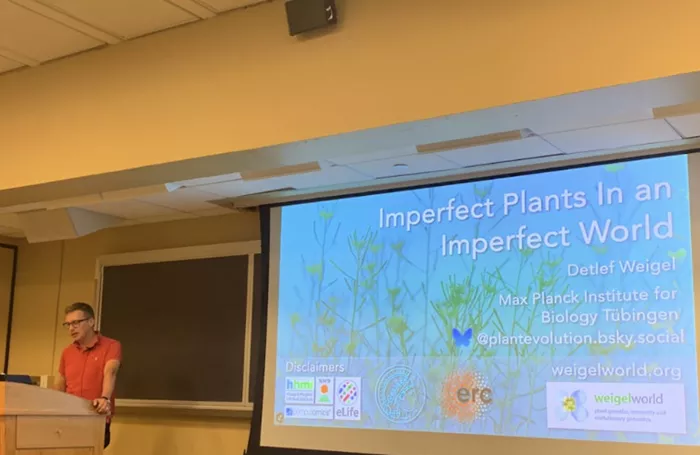On October 25, the Department of Biology hosted Detlef Weigel, director of the Max Planck Institute for Biology in Tübingen and a member of the National Academy of Sciences. Weigel delivered a talk titled “Imperfect Plants in an Imperfect World,” focusing on his research group’s studies on genetic variation in Arabidopsis thaliana, a model organism in plant biology.
Weigel began by addressing the common perception of mutations as harmful. He noted that mutations in specific genes can lead to dysfunctional proteins, resulting in serious conditions such as sickle cell disease and cystic fibrosis, which affect millions globally.
“When we think of human diseases, we often associate them with mutations that disrupt normal functions and cause illness,” Weigel explained. “However, many mutations that lead to disease were once beneficial in different contexts. Context plays a crucial role in genetics, and evolutionary geneticists have developed various terms to describe this phenomenon.”
One such term, antagonistic pleiotropy, refers to a gene variant that has opposing effects on an organism’s fitness. For instance, an allele that causes early flowering may harm a plant’s water efficiency since flowering requires more water. Conversely, this trait may be beneficial during droughts, allowing for earlier pollination and seed production.
Weigel shared findings from his research on a mutation in the Arabidopsis gene known as ACCELERATED CELL DEATH 6 (ACD6). This mutation resulted in smaller plant size and leaf necrosis—traits that initially appeared to reduce fitness. However, he discovered that these plants exhibited stronger immune responses than wild-type plants. The leaf necrosis stemmed from an overactive immune response against the plant’s own tissues.
“We rediscovered a phenomenon known as hybrid necrosis,” Weigel noted. “Interestingly, we were the first to link it to autoimmunity. Previous literature recognized the phenomenon, but many researchers did not realize that genetic constitution could trigger an immune response against pathogens.”
Following this laboratory discovery, Weigel expanded his research into natural settings.
“To understand the evolution of the immune system, we needed to go into the wild,” he stated. “In 2018, we launched the ‘Pathogen and Arabidopsis’ collection, gathering nearly 300 plant populations across Europe in a short time.”
Weigel’s team not only examined plant genotypes but also their associated microbiomes. They found that Arabidopsis microbiomes clustered geographically, with distinct groups in Northern and Southern Europe. Their analysis revealed that drought severity in a region, measured by the Palmer Drought Severity Index, was the primary factor explaining this clustering.
Using a genome-wide association study approach, Weigel compared immune gene expression between the two Arabidopsis clusters and their microbiomes. He found that the most significantly expressed gene was ACD6, the same hybrid necrosis gene identified in the lab.
To further investigate this mutation’s biological relevance, Weigel’s team created ACD6 genetic knockouts and grew them in both greenhouse and field conditions. Under controlled conditions in the greenhouse, the ACD6 knockout plants exhibited the hybrid necrosis phenotype, showing reduced size and significant leaf necrosis. However, the results were unexpected in the wild.
“All morphological differences vanished,” Weigel said. “There were no differentially expressed genes, and the microbiomes showed no significant variations between ACD6 knockouts and wild-type plants.”
Weigel hypothesizes that this discrepancy arises from the complexities of plant growth in natural environments compared to controlled laboratory settings.
“Laboratory genetics may appear straightforward, but real-life ecology is far more complex,” he explained. “That’s why my favorite quote is: ‘Nothing in evolution makes sense except in the light of ecology.’”
Related topics:
- Dry Spell Hits Flower Farmers Hard at Rehoboth Beach Farmers Market
- Urgent Demand for Government Action on UK Border Issues for Plants and Cut Flowers
- Farmers Gather Vibrant Marigold Blooms in Ichangu Narayan


